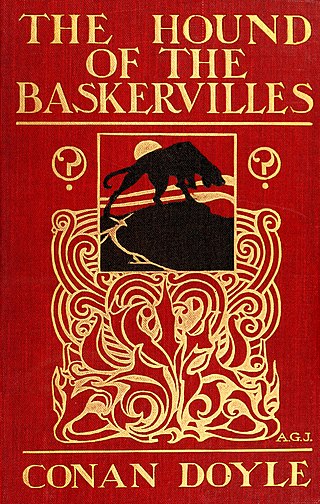
The Hound of the Baskervilles is the third of the four crime novels by British writer Arthur Conan Doyle featuring the detective Sherlock Holmes. Originally serialised in The Strand Magazine from August 1901 to April 1902, it is set largely in Dartmoor, Devon, in England's West Country and follows Holmes and Watson investigating the legend of a fearsome, diabolical hound of supernatural origin. This was the first appearance of Holmes since his apparent death in "The Final Problem", and the success of The Hound of the Baskervilles led to the character's eventual revival.

William Godwin was an English journalist, political philosopher and novelist. He is considered one of the first exponents of utilitarianism and the first modern proponent of anarchism. Godwin is most famous for two books that he published within the space of a year: An Enquiry Concerning Political Justice, an attack on political institutions, and Things as They Are; or, The Adventures of Caleb Williams, an early mystery novel which attacks aristocratic privilege. Based on the success of both, Godwin featured prominently in the radical circles of London in the 1790s. He wrote prolifically in the genres of novels, history and demography throughout his life.
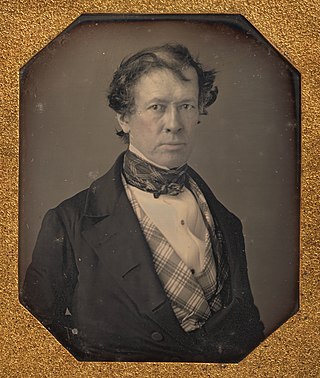
John Pendleton Kennedy was an American novelist, lawyer and Whig politician who served as United States Secretary of the Navy from July 26, 1852, to March 4, 1853, during the administration of President Millard Fillmore, and as a U.S. Representative from Maryland's 4th congressional district, during which he encouraged the United States government's study, adoption and implementation of the telegraph. A lawyer who became a lobbyist for and director of the Baltimore and Ohio Railroad, Kennedy also served several terms in the Maryland General Assembly, and became its Speaker in 1847.

The Narrative of Arthur Gordon Pym of Nantucket, written in 1838, is the only complete novel by American writer Edgar Allan Poe. The work relates the tale of the young Arthur Gordon Pym, who stows away aboard a whaler called the Grampus. Various adventures and misadventures befall Pym, including shipwreck, mutiny, and cannibalism, before he is saved by the crew of the Jane Guy. Aboard this vessel, Pym and a sailor named Dirk Peters continue their adventures farther south. Docking on land, they encounter hostile, black-skinned natives before escaping back to the ocean. The novel ends abruptly as Pym and Peters continue toward the South Pole.
William Joseph Kennedy is an American writer and journalist who won the 1984 Pulitzer Prize for his 1983 novel Ironweed.
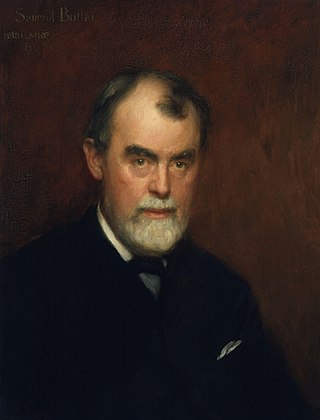
Samuel Butler was an English novelist and critic, best known for the satirical utopian novel Erewhon (1872) and the semi-autobiographical novel The Way of All Flesh. Both novels have remained in print since their initial publication. In other studies he examined Christian orthodoxy, evolutionary thought, and Italian art, and made prose translations of the Iliad and Odyssey that are still consulted.
The Irish Literary Revival was a flowering of Irish literary talent in the late 19th and early 20th century. It includes works of poetry, music, art, and literature.

Thomas Crofton Croker was an Irish antiquary, best known for his Fairy Legends and Traditions of the South of Ireland (1825–1828), and who also showed considerable interest in Irish song and music.
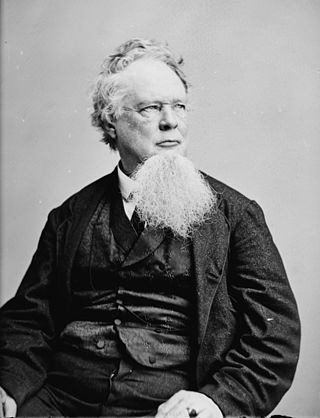
William Gilmore Simms was a poet, novelist, politician and historian from the American South. His writings achieved great prominence during the 19th century, with Edgar Allan Poe pronouncing him the best novelist America had ever produced. He is still known among literary scholars as a major force in antebellum Southern literature. He is also remembered for his strong support of slavery and for his opposition to Uncle Tom's Cabin, in response to which he wrote reviews and the pro-slavery novel The Sword and the Distaff (1854). During his literary career he served as editor of several journals and newspapers and he also served in the South Carolina House of Representatives.

Robert Olen Butler is an American fiction writer. His short-story collection A Good Scent from a Strange Mountain was awarded the Pulitzer Prize for fiction in 1993.

Adventure fiction is a type of fiction that usually presents danger, or gives the reader a sense of excitement. Some adventure fiction also satisfies the literary definition of romance fiction.

Pauline Sara Jo Moyes, known professionally as Jojo Moyes, is an English journalist and, since 2002, an award-winning romance novelist, #1 New York Times best selling author and screenwriter. She is one of only a few authors to have twice won the Romantic Novel of the Year Award by the Romantic Novelists' Association and her works have been translated into twenty-eight languages and have sold over 40 million copies worldwide.

Daniel Pierce Thompson was an American author and lawyer who served as Vermont Secretary of State and was New England's most famous novelist prior to Nathaniel Hawthorne.

This is a bibliography of works by Mary Shelley, the British novelist, short story writer, dramatist, essayist, biographer, and travel writer, best known for her Gothic novel Frankenstein: or, The Modern Prometheus (1818). She also edited and promoted the works of her husband, the Romantic poet and philosopher Percy Bysshe Shelley. Until the 1970s, Mary Shelley was known mainly for her efforts to publish Percy Shelley's works and for Frankenstein. Recent scholarship has yielded a more comprehensive view of Mary Shelley’s achievements, however. Scholars have shown increasing interest in her literary output, particularly in her novels, which include the historical novels Valperga (1823) and Perkin Warbeck (1830), the apocalyptic novel The Last Man (1826), and her final two novels, Lodore (1835) and Falkner (1837). Studies of her lesser-known works such as the travel book Rambles in Germany and Italy (1844) and the biographical articles for Dionysius Lardner's Cabinet Cyclopaedia (1829–46) support the growing view that Mary Shelley remained a political radical throughout her life. Mary Shelley's works often argue that cooperation and sympathy, particularly as practised by women in the family, were the ways to reform civil society. This view was a direct challenge to the individualistic Romantic ethos promoted by Percy Shelley and Enlightenment political theories.

William Mudford was a British writer, essayist, translator of literary works and journalist. He also wrote critical and philosophical essays and reviews. His 1829 novel The Five Nights of St. Albans: A Romance of the Sixteenth Century received a good review from John Gibson Lockhart, an achievement which was considered a rare distinction. Mudford also published short fictional stories which were featured in periodicals such as Blackwood's Edinburgh Magazine, Fraser's Magazine, and Bentley's Miscellany.
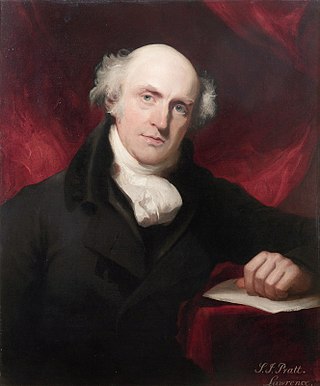
Samuel Jackson Pratt was a prolific English poet, dramatist and novelist, writing under the pseudonym of "Courtney Melmoth" as well as under his own name. He authored around 40 publications between 1770 and 1810, some of which are still published today, and is probably best remembered as the author of Emma Corbett: or the Miseries of Civil War, (1780) and the poem Sympathy (1788). Although his reputation was tainted by scandal during his lifetime, he is today recognised as an early campaigner for animal welfare and the first English writer to treat the American Revolution as a legitimate subject for literature.
William Alexander Caruthers (1802–1846) was an American novelist.
Volksmärchen der Deutschen is an early collection of German folk stories retold in a satirical style by Johann Karl August Musäus, published in five volumes between 1782 and 1787.
A Blot in the 'Scutcheon is a tragedy in blank verse by Robert Browning, published in 1843 and acted in the same year.













